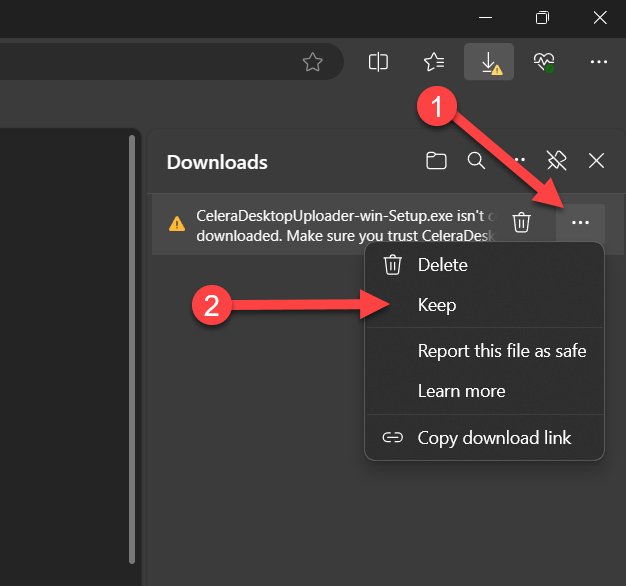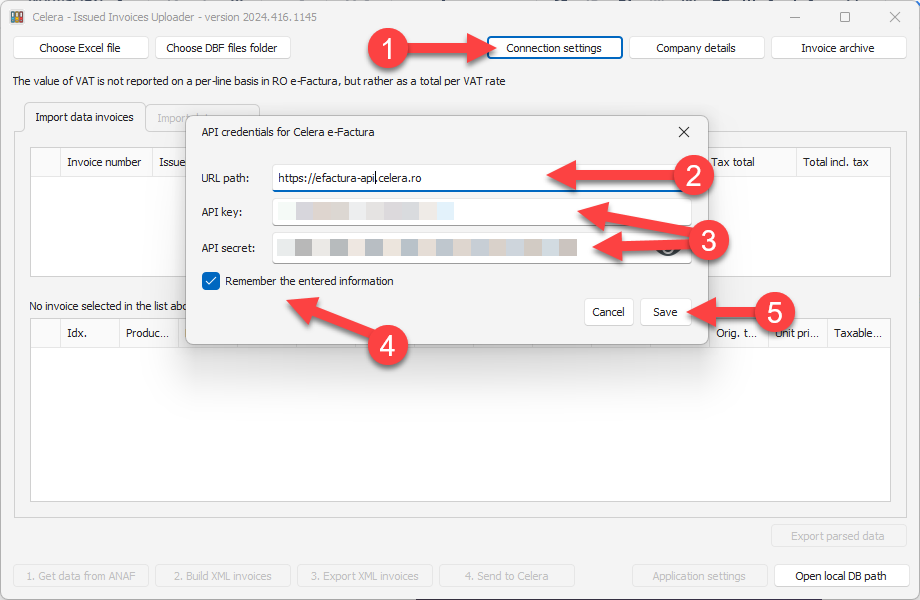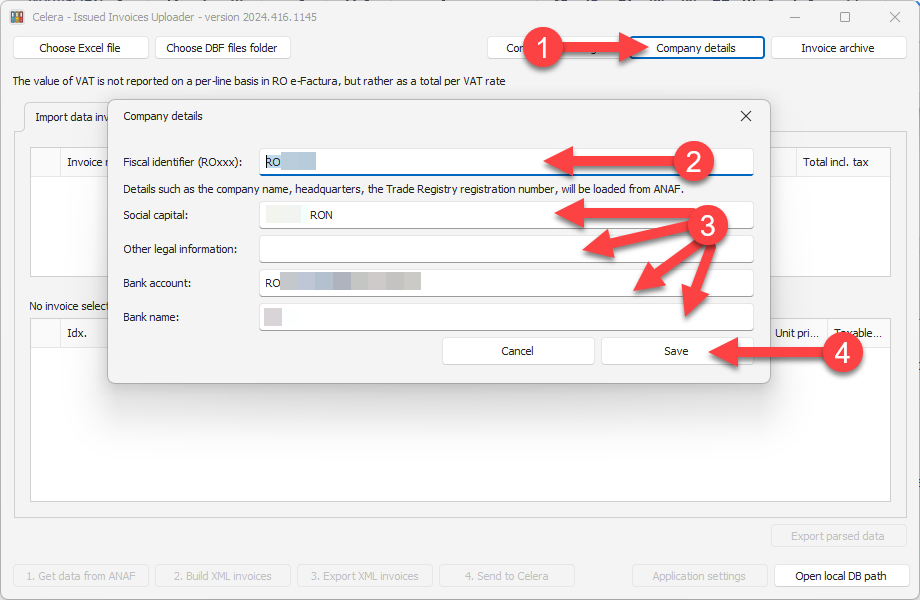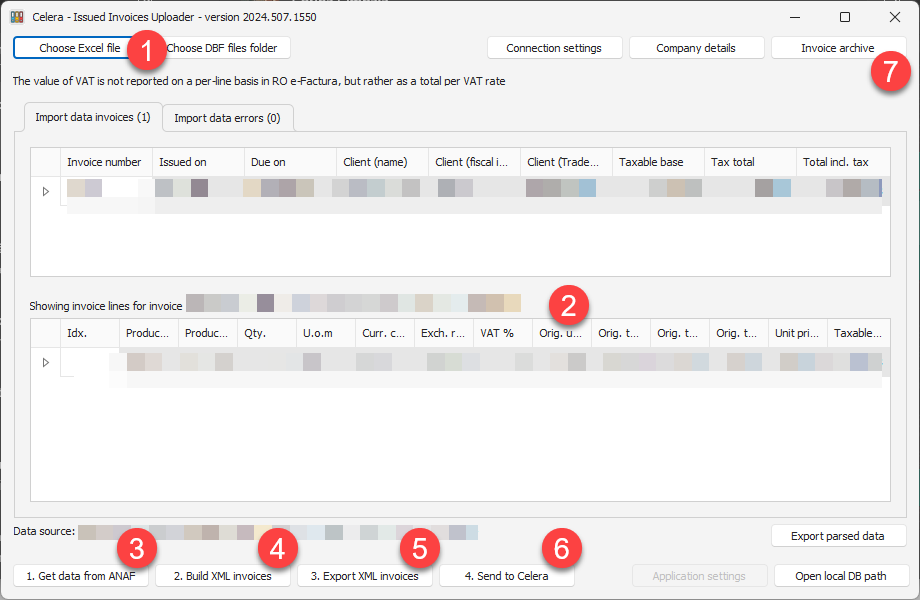Importing invoices using the desktop client
The desktop client is the better solution when you either do not have loose XML files that you can import directly or when you have a large number of invoices that you want to import in one go.
The client leverages a simple Excel file format that allows you to describe the contents of your invoices, retrieves client details from ANAF in order to have the most up-to-date client data, de-duplicates invoices and uploads them to Celera e-Factura.
Downloading the desktop client
The latest version of the desktop client can always be downloaded from the following address:
It is possible that the web browser will mark the downloaded file as unknown, in which case you should click the hamburger menu and choose the “Keep” option from the menu:

Afterwards, you should allow the opening of the file and then finally run it:
After the installation is complete, you should see the Celera Desktop Uploader icon on your Desktop and tha application should start:

Configuring the connection to Celera e-Factura
In order for the desktop client to communicate with Celera e-Factura on your account, you need to configure the connection and authorization information:
Click on “Connection settings”
Set the value of “URL path” to
https://efactura-api.celera.roSet the API key and API secret. In order to get an API key, follow the steps described in Creating an API key for the Celera desktop client
Make sure the “Remember the entered information” checkbox is ticked
Click on “Save”

Once the connection settings are configured, you can set up the company details and then upload invoices.
Configuring the company details
In order for invoices to be properly uploaded to Celera e-Factura, the supplier company information needs to be provided.
The detailed company information such as the name and fiscal address are retrieved automatically from ANAF, only the other supplier details need to be added.
In order to configure the company details, do the following:
Click on “Company details”
Set the fiscal identifier of the company
Set the other mandatory supplier information
social capital
other legal information (e.g. whether the company is under administration)
bank account and bank number
Save the entered information

Preparing an import Excel file
A template Excel file for importing invoices in Celera RO e-Factura can be downloaded below:
Celera e-Factura import model v4.xlsx
For invoices with multiple lines, all you need to do is repeat the header fields (marked specifically in the fields list table) for each of the lines of the same invoice. The lines need to be present in order in the import file (i.e. you cannot intertwine lines from multiple invoices).
For some header fields (e.g. client address or invoice currency), only the value for the first line will be used.
The meaning of each header field is as follows:
Field name | Type | Mandatory | Example | Notes |
|---|---|---|---|---|
Client name | Header | ✅ | ||
Client code | Header |
| E.g. client code in ERP | |
Tax Number/PIN | Header | J40/10468/2007 | Not mandatory, will be retrieved from ANAF if available | |
VAT Number | Header | ✅ | ||
Invoice No | Header | ✅ | ||
Invoice date | Header | ✅ | Make sure it is an Excel date value | |
Invoice due date | Header | ✅ | Make sure it is an Excel date value | |
Product name | Line | ✅ | Will be truncated to 150 characters | |
Product code | Line | Optional, will be set as the supplier-provided product code | ||
Quantity | Line | ✅ | ||
Measure | Line | An ISO code is required. If not provided, | ||
Price | Line | ✅ | The price without VAT applied. So if the sale price with 19% VAT is | |
Currency code | Line | ✅ | RON | If not |
Currency rate | Line | ✅ | 1 | If used, the values will be calculated using this, to the 7th decimal |
VAT percent | Line | ✅ | 19 | One of the valid VAT percentages, or 0 for VAT-exempt lines |
VAT base | Line | ✅ | The line value without VAT applied. If the currency rate is provided, will be recalculated using that | |
VAT value | Line | ✅ | Only for cross-checks, as VAT value is recalculated based on VAT base | |
Total including VAT | Line | ✅ | Only for cross-checks | |
Invoice currency | Header | EUR | If the invoice’s actual currency is not | |
VAT value (local currency) | Line | The amount of VAT in | ||
Line Details | Line | Other line details | ||
Invoice details | Header | Only the value on the first line will be used | ||
Client address - city | Header | Optionally, the exact client city to use; note restrictions for Bucharest | ||
Client address - street | Header | Optionally, the exact client street address to use | ||
Client address - county code | Header | Optionally, a value from the “license plate” county code list | ||
Client address - country code | Header | Optionally, the client country, if it is not located in Romania | ||
Despatch document reference | Header | Despatch D001 | Optional; the ID of the despatch document | |
Product standard code | Line | 54491472 | Optional; the EAN/UPC code of the product | |
Invoice type code | Header | 380 | Optional; used to specify a different invoice type. Values are:
| |
Invoice buyer reference | Header | ABCD1234 | An identifier assigned by the Buyer used for internal routing purposes. UBL business term code | |
Purchase order reference | Header | PO-1234 | An identifier of a referenced purchase order, issued by the Buyer. UBL business term code | |
Line CPV code | Line | 30190000-7 | Required when sales are made for public sector procurement agreements. Will be reported as “STI” list commodity classification code. Should be a value present in the Common Procurement Vocabulary (CPV). |
Once you have prepared an Excel file, you can proceed with the validating and processing of the data in order to send the invoices to Celera e-Factura and then to the RO e-Factura system.
Loading and processing the import Excel file
Once you have an Excel file prepared, follow these steps to load and process the file:
Click on “Choose Excel file” and select the import file (1)
If any errors are found during the parsing of the Excel file, they will be displayed. Also, clients with invalid VAT codes (e.g. EU companies outside Romania) will show up in the “Import data errors” tab, and the entries for them will be skipped.
Double-check the data extracted from the Excel file using the invoices grid above and, when selecting an individual invoice, the invoice lines grid below (2).
Click on “Get data from ANAF” (3) to enrich the existing data with company information from ANAF.
The ANAF web services sometimes face issues and are unavailable. In that situation, the ANAF data retrieval will fail and you will need to perform the import steps at a later time, when they are again available.
Click on “Build XML invoices” (4). The XML data in UBL format for RO e-Factura will next be generated.
Optionally click on “Export XML invoices” (5). This will export the generated XML data as individual files for any manual validations that might be necessary.
Click on “Send to Celera” (6).
a dialog will pop-up, allowing you to double-check the connection settings
the invoices will be checked against the data already in Celera in order to skip invoices that were sent in previous uploads
the invoices will be uploaded to Celera
Optionally click on “Invoice archive” (7) to see the list of invoices that were uploaded to Celera.
Log into the Celera web app and notice the invoices being gradually processed and sent to the RO e-Factura system.

